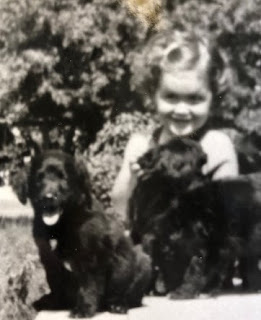Let me start by admitting what most of you already know: I haven't considered myself as young for a very long time. Next, I should tell you, I am not on TikTok. However, you probably also know that I am curious. When I saw a young woman screaming into a camera something like 'she loved TikTok and couldn't live without it, and if that destroyed the United States she didn't care' I decided maybe it was time for me to learn a little about TikTok.
One of my sources was a post on Oprah. "The use of artificial intelligence--like using facial recognition for its filter and filling one's feed with highly customized recommendations--the app is able to provide its users with exactly what they want and nothing they don't want." Their users are primarily ages 24 and younger."
 |
| Lyn with Clark's dog Jack and her dog Curley, pals through high school. |
You have probably heard that America is concerned that China, which is the source of TikTok, may be using it as a tool to get a glimpse into American thinking through the choices and participation of American viewers. I certainly got a glimpse of one such American when I watched that young girl screaming that she didn't care if America was destroyed. Apparently, China thinks Americans between age 24 and younger have an attention span of 15 seconds, because that is the common length of the videos on TikTok! However, references to shorter and longer videos can be found. The lengths I have found online range from 3 seconds to 12 minutes, with other lengths cited in between
Should America be concerned? First, let me say that I have never watched TikTok and do not plan to watch it. The concerns range from censorship to the influence of public debates to young people using it for social activism to manipulating popularity (or lack of popularity) by prioritizing content.
What concerns me is that young Americans are exposed to reinforcing an attention span of 15 seconds by watching clips that length consistently. There is a certain discipline in learning to focus attention on something or someone for a long period of time. It concerns me that we may be weakening that ability by reducing the habits of enjoying things that take lengthy attention.
It also concerns me to learn that China has banned Instagram, Twitter and Facebook. Why would they maintain a platform that is shown worldwide but forbid their own citizens from watching American programs.
TikTok says its mission is to "capture and present the world's creativity, knowledge and moments," adding that it allows young people to express themselves. Remember, however, the common allotted time is 15 seconds. How much worthwhile creativity and knowledge can be fit into 15 seconds?
 |
| One of Lyn's well-worn piano practice music books. |
Now I am about to reveal just how very old I am, by describing how I used my idle time when I was 24 and younger. Actually, after leaving high school I was a full-time student, a 30-hour a week employee, and a wife, so if there had been such a thing as TikTok it is very unlikely I would have had time to waste on it. So, here are the ways I used my free time at age 18 and younger.
1. I read books. Lots of books of all kinds. I traveled the world and went back in time and was rich and poor, male and female, black and white and brown, exploring the world, meeting countless nationalities, meeting heroes and villains, and experiencing countless other things because I lived those things in books.
2. I drew pictures. They weren't necessarily good, but I got better as I tried.
3. I played the piano. To be honest, much of the time I practiced because my mother required it, but I came to love it, because I was good enough to play popular music.
4. I wandered. I walked miles and miles on the sandy roods around the farm, often making up stories as I walked, wandering shelter belts observing trees and weeds and bugs and tracks in the sand, learning to mimic birds, and observing the natural world.
5. I sewed, a skill my mother taught me that I have used my entire life.
6. I followed my father around the farm, learning things from him, such as the names of trees, how to check seeds using damp paper towels between two pieces of glass, how to use tools, and listening to tales of his childhood.
7. I cooked, helping my mother and becoming responsible for cooking in the summer while my mother worked in the garden and canned.
8. I played--with the cats and dogs, with my family, with visiting friends and family--horse shoes, bat gammon, croquet.
9. I learned how to be comfortable with solitude, perhaps to fill it with some activity but also to just enjoy being alone.
Those are the things that make me worry about today's kids who rarely live in solitude--without the television, without their phones, without their computers, without something or someone to entertain them.
In making this list, I put reading first, because reading expands your mind, but I believe solitude is also essential for kids to learn to reflect on themselves and the world around them. I am grateful that I grew up on the farm where I could see the stars at night and wander fields and pastures. Few kids today have that experience, but somehow, they need to find solitude somewhere so they can discover how to be alone with themselves. If 15 second "creativity, knowledge, and moments" are all that people are satisfied to have, that really is something to worry about.

